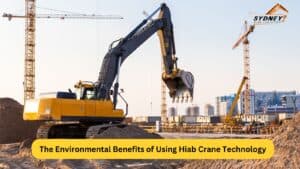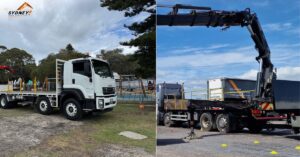Sustainability in transportation and logistics is more than a passing trend; it is becoming an integral component of how companies operate in today’s environmentally sensitive world. Sydney Hiab Logistics is an excellent example of a Sydney-based firm that has not only recognised the growing need for sustainable practices but has also made substantial steps to guarantee that its operations are in line with a greener, more sustainable future. Sydney Hiab Logistics, a prominent provider of Hiab truck services, is creating the future of transport logistics in the region by incorporating sustainability into every aspect of their company model.
With the global climate crisis forcing a rethinking of traditional modes of transportation, logistics companies must adapt to address modern environmental problems. The logistics industry, particularly in urban areas such as Sydney, contributes significantly to greenhouse gas emissions and traffic congestion. As a result, firms such as Sydney Hiab Logistics are progressively implementing initiatives to decrease their carbon footprints, waste, and fuel efficiency.
This blog investigates how Sydney Hiab Logistics promotes sustainable transportation in Sydney, ranging from fleet management advances to community-driven environmental activities.
1. Sydney Hiab Logistics Commitment to Sustainability
Sydney Hiab Logistics’ attitude to sustainability extends beyond regulatory compliance; it is ingrained in their broader goal of long-term growth and environmental stewardship. The company’s executives have made a conscious commitment to promote sustainability in all parts of its operations. This devotion is mirrored in their business activities, which range from investing in environmentally friendly technologies to launching projects that contribute to a cleaner, greener environment.
One key aspect of their sustainability strategy is focusing on fuel efficiency and adopting cleaner fuel options. By using fuel-efficient vehicles, Sydney Hiab Logistics can cut down on fuel consumption, thereby reducing both operational costs and emissions. Furthermore, the company is working closely with local authorities and stakeholders to promote greener transport policies across the Sydney region.
As metropolitan areas expand, so does the demand for logistics services, putting additional strain on infrastructure and the environment. Sydney Hiab Logistics recognises the challenge and is constantly working to implement methods that reduce its environmental impact. This involves embracing technology, purchasing electric vehicles, and supporting sustainable business methods that contribute to the circular economy.
2. Fuel Efficiency and Emission Reduction
Improving fuel efficiency and lowering harmful emissions are two of the most important aspects of sustainable transportation. Sydney Hiab Logistics has taken many steps to ensure that its fleet functions as effectively as possible. The company invests in contemporary, fuel-efficient Hiab trucks outfitted with cutting-edge engine technologies that reduce fuel consumption and, thus, pollution.
The adoption of fuel-efficient technologies in the fleet is not only a financial but also an environmental choice. For example, the use of more efficient engines and modern transmission systems allows automobiles to use less gasoline per kilometer, greatly lowering their carbon footprint. This is a critical stage in the transportation industry, which accounts for a major amount of global carbon emissions. Sydney Hiab Logistics directly contributes to global climate change mitigation initiatives by boosting fuel economy.
Furthermore, Sydney Hiab Logistics collaborates with suppliers who support the company’s dedication to sustainability. This includes employing cleaner fuels like biofuels and natural gas, which emit fewer pollutants than conventional diesel. While switching to cleaner fuels needs money and planning, it is an important step toward creating a more sustainable transportation network.
In addition to decreasing emissions from the vehicles, Sydney Hiab Logistics considers the overall impact of its operations. For example, the company regularly monitors fuel consumption, finding areas for improvement and encourages drivers to develop more environmentally friendly driving habits. This technique guarantees that fuel economy is maximised across the fleet, resulting in cost savings and a reduction in overall emissions.
3. Optimising Transport Routes and Reducing Traffic Congestion
Route optimisation is an often ignored yet extremely effective approach for promoting sustainable transportation. Sydney Hiab Logistics uses innovative logistics management systems and GPS technologies to determine the most effective transportation routes. By improving these routes, the company can cut fuel usage and overall emissions, helping to create a more sustainable transportation model.
Traffic congestion is a typical issue in Sydney, especially during peak hours, and it has a considerable influence on fuel usage and emissions. Stop-and-go driving, frequent idling, and extended travel durations waste fuel and increase pollutants. Sydney Hiab Logistics may use real-time data and analytics to find the most efficient routes for their cars, avoiding congested regions and decreasing driving time. This not only helps to reduce gasoline usage but also ensures faster deliveries and less load on Sydney’s already overburdened infrastructure.
Furthermore, route optimisation is critical to enhancing fleet productivity. By reducing the number of kilometers travelled and eliminating traffic delays, Sydney Hiab Logistics can accomplish more jobs with fewer vehicles, lowering its environmental impact even further. This method is consistent with broader goals such as reducing urban congestion, fostering more efficient transportation systems, and minimising the carbon impact of the logistics industry.
The company also works with municipal governments and other stakeholders to influence the development of transportation networks and policies that decrease congestion. Sydney Hiab Logistics is contributing to the development of a more sustainable urban transportation scene in Sydney by participating in the discourse.
4. Reducing Waste and Recycling in the Logistics Industry
Waste management is an important part of logistical sustainability. Sydney Hiab Logistics strives to reduce, reuse, and recycle resources throughout its operations. Whether it’s packaging, automotive components, or construction debris, the organisation makes certain that garbage is disposed of in an environmentally friendly manner. The logistics sector generates a large amount of waste, and Sydney Hiab Logistics is committed to reducing this impact.
One of the company’s main goals is the usage of recyclable and biodegradable packaging materials. Instead of using single-use plastics and non-recyclable products, Sydney Hiab Logistics has converted to more environmentally friendly options. This is especially crucial in cities like Sydney, where waste management and environmental issues are becoming increasingly prevalent.
Furthermore, Sydney Hiab Logistics has invested in methods to reduce packaging waste during the transportation process. By combining shipments and using reused containers, the company decreases the amount of waste produced with each delivery. The emphasis on decreasing packaging waste is part of a larger effort to reduce overall material waste, which reduces the burden on landfills and promotes a circular economy.
The recycling of vehicle components is another way that Sydney Hiab Logistics demonstrates its commitment to sustainability. As part of its fleet management plan, a company makes certain that obsolete and damaged parts are recycled or repurposed whenever possible. This not only eliminates waste, but it also contributes to the overall sustainability aim of minimising the demand for fresh resources, conserving energy, and lowering industrial emissions.
5. Use of Electric and Hybrid Vehicles
As part of its continued efforts to cut emissions and promote sustainability, Sydney Hiab Logistics is researching the usage of electric and hybrid cars in its fleet. The switch to electric vehicles (EVs) is a major change in decreasing the logistics industry’s carbon footprint, especially given the significant emissions produced by typical diesel-powered trucks.
Electric vehicles are noted for their capacity to emit zero emissions at the tailpipe, making them an effective tool in the fight against air pollution. Although electric Hiab trucks are still in their early stages in the logistics industry, Sydney Hiab Logistics is leading the way. To further lessen its environmental impact, the corporation is heavily investing in electric vehicle technology and incorporating hybrid trucks into its fleet.
In addition to being eco-friendly, electric and hybrid vehicles have lower operating costs. EVs have fewer moving components, resulting in lower maintenance expenses during their lifespan. They also use less gasoline, which directly translates into cost savings for Sydney Hiab Logistics. By using these vehicles, the corporation not only reduces emissions but also ensures long-term operational efficiency.
Sydney Hiab Logistics is also collaborating with manufacturers and industry partners to investigate advances in battery technology that will make electric Hiab trucks even more viable for long-haul and heavy-duty applications. The introduction of electric vehicles into the fleet is a significant step toward the company’s eventual objective of being carbon neutral.
6. Eco-Friendly Practices in Load Management and Hauling
Sydney Hiab Logistics is working to improve its load management procedures in addition to increasing fleet fuel efficiency and implementing greener technologies. Proper load management is critical for eliminating unnecessary trips, lowering fuel consumption, and increasing overall transportation efficiency.
Sydney Hiab Logistics relies heavily on load consolidation as one of its primary methods. The company decreases the number of trips required by aggregating smaller shipments into larger ones, resulting in lower fuel consumption and emissions. This method not only optimises fleet capacity but also helps to alleviate traffic congestion, so contributing to a more sustainable Sydney transportation network.
Furthermore, Sydney Hiab Logistics guarantees that each vehicle in its fleet is running at full capacity. By making maximum use of the available capacity in each truck, the company increases operating efficiency and minimises the number of trucks required for a specific assignment. This is especially crucial in cities like Sydney, where space is limited, and wasteful travels have a large environmental impact.
7. Industry Collaborations and Community Engagement
Sydney Hiab Logistics recognises that sustainability requires a communal effort. That is why the company actively works with other businesses, industry organisations, and local governments to promote sustainable transportation alternatives. These collaborations allow the company to exchange expertise, develop new technologies, and influence legislation that will lead to a more sustainable future.
The corporation is involved in a few local programs aimed at lowering carbon emissions and increasing the general sustainability of Sydney’s transportation networks. Through these relationships, Sydney Hiab Logistics hopes to push the larger logistics industry to embrace sustainable practices. By sharing best practices and promoting innovation, Sydney Hiab Logistics is paving the path for a more environmentally responsible logistics sector.
Sydney Hiab Logistics also values community participation. The company actively participates in public education campaigns on the necessity of sustainable transportation and the role that logistics companies play in decreasing environmental impact. This interaction not only raises awareness, but it also empowers consumers and businesses to make more environmentally conscious decisions.
8. The Future of Sustainable Transport at Sydney Hiab Logistics
As the world strives for a more sustainable future, Sydney Hiab Logistics is committed to remaining at the forefront of innovation. To further lessen its environmental effect, the company is experimenting with a few innovative technologies and initiatives. From completely electric Hiab trucks to powerful AI-powered route optimisation tools, Sydney Hiab Logistics is constantly searching for new methods to make its operations more environmentally friendly.
The development of hydrogen-powered trucks is one area that seems promising in the future. While hydrogen fuel cells are still in their early phases of development, they have the potential to transform the logistics business. Hydrogen-powered vehicles can travel great distances with zero emissions, making them a viable alternative to diesel-powered trucks. Sydney Hiab Logistics is actively tracking these advances and intends to add hydrogen-powered cars to its fleet as soon as the technology is commercially available.
In the coming years, Sydney Hiab Logistics hopes to dramatically reduce its carbon footprint by expanding its electric vehicle fleet, introducing more efficient logistics management technologies, and working more closely with industry partners to promote sustainability. The company’s goal is to become carbon neutral, establishing a new benchmark for sustainable transportation in Sydney.
Conclusion
Sydney Hiab Logistics is not only adjusting to the changing demands of the transportation sector; it is also actively crafting a more sustainable future. The corporation is taking considerable steps to reduce its environmental effect by combining fuel-efficient technologies, electric vehicles, eco-friendly practices, and strategic collaborations.
Sustainability in transportation is no longer a choice; it is critical to the planet’s health and the future of urban development. Sydney Hiab Logistics is contributing to the development of a greener, more sustainable transportation network for Sydney and beyond by continuing to innovate and set the example. As the organisation progresses toward sustainability, it is dedicated to promoting good change and setting a new standard for environmentally friendly logistics.




